You are not logged in. Please register or login.
- Topics: Active | Unanswered
Re: GnR Band Member Interviews from 2009-10 Tour
1/11/11 **BBF: There's plenty of touring planned for the near future **
http://www.bumblefoot.com/press/2011010 … _Sound.htm
The Sound magazine
JAN 2011 ● Volume 1
Cover photo, 13-page feature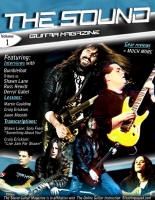
IC: Since it is officially almost 2011, do you have any this years Resolutions?
BBF: 2010 was quite a year – toured all over the world with Guns, and busted butt in-between legs of the tour gettin' things done – guest solos, producing, collaborating, put a song on Rock Band Network, releasing a TAB book, and prepped new songs to be released in 2011. Goals and resolutions for 2011? Every year the goal is to get done whatever I can, and stay healthy while I'm doin' it. In particular, I'm looking forward to releasing a few songs - not a full album, just one-off's, releasing them as I get 'em done. 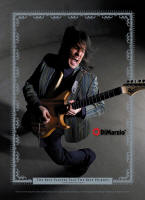
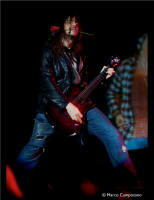
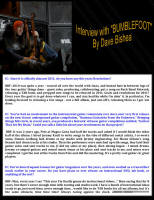
IC: You've had an involvement in the instrumental guitar community ever since your very first release on the now-classic underground guitar compilation, "Ominous Guitarists From the Unknown." Bringing things full-circle, in recent years, you produced a fantastic virtuoso guitar compilation entitled, "Guitars That Ate My Brain." Could you talk a little bit about your involvement on that project?
BBF: It was 2 years ago, Pete at Magna Carta had half the tracks and asked if I would finish the other half of the album. I hired Jeremy Krull to write songs in the vibe of different metal artists, I co-wrote some, Dennis Leeflang laid drums at my studio with Jeremy engineering. For Shane Gibson's song Dennis laid drum tracks at his studio. Then the performers were matched up with songs, they laid their guitar solos and sent tracks to me, (I did my solos at my place), then mixing began - I mixed drums, Jeremy re-amped guitars and mixed music stems at his place and sent tracks to me, and mixes were completed. I got the rest of the tracks from Pete and did the mastering. It's a pretty cool guitar cd, great players. 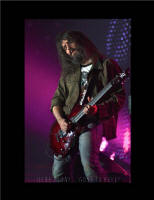
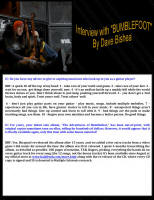
IC: You've done frequent lessons for guitar magazines over the years, and even worked as a transcriber much earlier in your career. Do you have plans to ever release an instructional DVD, tab book, or anything of the sort?
BBF: Man, every year I say "This year I'm finally gonna do instructional videos..." Been saying that for 8 years, but there's never enough time with touring and studio work. I have a bunch of instructional ideas ready to go, just need time, never enough time... would like to do TAB books for all my albums, but it's the same obstacle, time time time! Always racing against the clock. AHHHHHHHHH!!!!!!!!!!!!!!!!
IC: Do you have any advice to give to aspiring musicians who look up to you as a guitar player?
BBF: A quick 10 off the top of my head: 1 - take care of your teeth and gums. 2 - take care of your feet. 3 - wait for no one, get things done yourself, now. 4 - it's an endless battle up a muddy hill while the world throws stones at you. Don't think about it, just keep pushing yourself forward. 5 - you don't get a 2nd brain, body and spirit. Treat yours well. Treat others' well. 6 - don't just play guitar parts on your guitar - play music, songs, include multiple melodies. 7 - experience all you can in life, have greater stories to tell in your music. 8 - unexpected things aren't necessarily bad things. Give up control and learn to roll with it. 9 - bad things are the push to make touching songs, use them. 10 - forgive your own mistakes and become a better person. Do good things.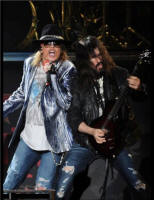
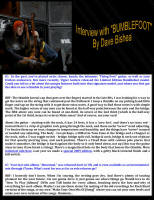
IC: In the past, you've played swiss cheese, hands, the infamous "Flying Foot" guitar, as well as your fretless endeavors. But more recently, Vigier Guitars released the Limited Edition Bumblefoot model. Could you tell us a bit about the unique features built into that signature model, and where you first got the idea to use a thimble in your playing?
BBF: The thimble (metal cap that goes over the finger) started in the late 80s, I was looking for a way to get the notes on the string that continued past the fretboard. I keep a thimble on my picking hand little finger and tap on the string with it to get those extra notes. A good way to find those notes is with simple math. The higher octave of any note can be found at the half-way point between the note and the bridge. The fifth above any note can be found at one-third, its octave at the 2nd third (which is the half-way point of the 1st third, hence its octave) Make sense? And of course, use your ears! 
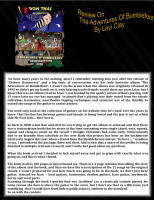
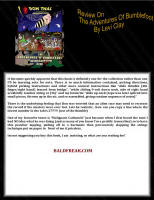
About the guitar - starting with the neck, it has 24 frets, it has a 'zero fret', and there's no truss rod - instead there's a strip of graphite rock going through the neck, and these necks *never* need adjusting. I've beaten them up on tour, changes in temperature and humidity, and the things have *never* warped or needed any adjusting. The body - two pickups, a DiMarzio Tone Zone at the bridge and a Chopper at the neck, with a 5-way toggle switch - bridge, bridge split-coil, bridge & neck, bridge & neck out-of-phase for that quacky piercing tone, and neck position. There's a Floyd Rose with custom pole pieces that make it smoother, the bridge is hard against the body so it only bend down, not up (this way the guitar stays in tune if you break a string). There's a magnetized hole on the body that houses the thimble. More technical info here. Last year we made a special 2009 edition, with a gritty black textured finish and a kill-switch.
IC: Your last solo album, "Abnormal," was released back in '08, and is even available as an instrumental mix through iTunes. What's next for you as far as solo releases go?
BBF: I honestly don't know. When I'm touring, the writing goes dry. **And there's plenty of touring planned for the near future.** I'm not gonna force it, just gonna see where things go. Would love to do "How To Play [Album]" DVDs and TAB books for every album, breaking down the how-and-why of everything for each album. Maybe I can use those stems I'm making of the old recordings for Rock Band versions of the songs, or my own "Make Your Own Mix Of [Song]" where you can set your own levels and make your own versions of the songs. Hmmmm...
IC: You've done various clinic tours and master-classes all over the world, including appearances at IA's Freak Guitar Camp, your Live at The RMA DVD, and so on. Now that you're working with GN'R, do you still have time to perform as a solo artist?
BBF: Because of the touring, life has gotten really backed up, I have a ToDo list that has about 4 years of work waiting to get done on it. And I love the studio so much more, when I have time I'd rather spend it in the studio creating. I got this old house that I've been slowly turning into a studio over the last few years. A place where you go to record, but it's like home - a place where you can live without distractions when you go there to record your album. Maybe after I get some things off the To-Do list I can think about doing solo gigs again.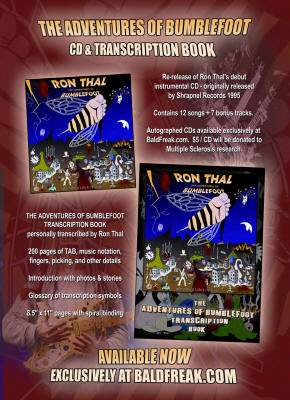
IC: The "Abnormal" album featured a song of yours called "Simple Days" (also heard on "Barefoot"), which has one of the most memorable solos I've ever heard. Do you have any particular process for writing guitar solos?
BBF: Thank you! Usually solos are played spontaneously in the rough tracks, and I use them as is or tweak them for the final tracks. That solo was a spontaneous one. It's funny, I think a lot of the melodic stuff on the album goes unnoticed sometimes, cool ya pointed that one out.. 
IC: Final question… You do a lot of fundraising, through various benefit concerts, the "9.11" album, and even a portion of your signature guitar cable sales going to charity. What foundations are you most closely associated with, and what could your fans do to help out?
BBF: Multiple Sclerosis Research Foundation, www.msrf.org started by my good friend Ralph Rosa. He was a guitar player and friend that was diagnosed with MS in 1997. He started a non-profit organization, with the support of friends and family. We would hold dinner/comedy events, concerts, and 100% of the proceeds went to researchers and labs working towards a cure. We did our homework and found the researchers we believed in, visited the labs, would get updates on progress. Ralph's physical condition reached a point where we had to cut back on events and just accept donations. I donate money from my autographed cds and merch. What can fans do to help? Just be good to each other, be strong honorable people - if y'all do that, the world will be a little better. That's what you can do to help.
www.thesound-guitarmagazine.com
Ron
Dec 29, 2010
NAMM MUSIC CONVENTION
(ANAHEIM, CA)
SAT JAN 15, 2011
2pm-3pm meet-n-greet
@ Engl Amplifiers booth #5824
SUN JAN 16, 2011
2pm-3pm meet-n-greet
@ Vigier Guitars booth #4762
1/11/11 **BBF: There's plenty of touring planned for the near future **
Re: GnR Band Member Interviews from 2009-10 Tour
http://guitarinternational.com/wpmu/201 … pyromania/
Ron “Bumblefoot” Thal Talks GNR, Vigier Guitars and Pyromania
By: Rick Landers
For guitarists, Guns N’ Roses tends to rank at the top of the list for hot rock bands and the group’s guitarists have always been the “Top Gun” of the group. That top gunner today is Ron “Bumblefoot” Thal, a formidable player and entertainer who has been with the group since 2006, when he took over guitar duties from the departed Brian “Buckethead” Carroll.
Thal’s technique is all over the map, with blistering arpeggios, double stops, extreme intervals – all mixed in a cauldron of metal, classical, blues, jazz and freak fret board navigation that’s reminiscent of the inventive Frank Zappa. But then what else would one expect from a guy who started out customizing his guitars by grabbing a drill and turning guitar bodies into Swiss cheese and is nicknamed “Bumblefoot”, after ulcerative pododermatitis, an inflammatory foot infection found in captive animals?
Venturing beyond GNR, Ron’s soundtrack work has credits on VH1, MTV, Hogan Knows Best, The Real World, The Osbournes, and the opening theme for Most Extreme Elimination Challenge (MXC). The New York Islanders hockey team’s promotions for their 2008-2009 season used Thal’s music to pump up their fans.
When Ron and I connected, he was hanging out after a flight delay to Anaheim, California, where he was scheduled to show up for Winter NAMM 2011, the largest music trade show in North America. We talked about his Vigier guitars, GNR, Slash, Scarlet Haze, teaching guitar, transcription and grabbing out of life all that you can, while you can.
Ron has also given us two free tab charts for you to download. You can grab the verse and solo to the song “Reach Down”, a track from the Scarlet Haze album scheduled to be released soon, by following our two links here.
Reach Down Verse
Reach Down Solo
http://guitarinternational.com/wpmu/201 … pyromania/
Rick: How’d you get involved with Vigier Guitars?
Ron: That was in about 1997. I think I was doing my first tour in France and one of their reps brought a guitar to one of the shows and said, “Hey, check this out.” I played it and at that point I had always built my own guitars. I would make my own little Frankenstein thing and played those.
The Vigier played amazing. It felt great and we started talking. I liked a lot of things about them that weren’t like most guitars, like the fact that there was no truss rod and they had the graphite sheet, which at first I was pretty skeptical. But I’ve beaten the hell out of these guitars for a dozen years now and there’s never been a single issue with the neck.
My tech loves it. He doesn’t have to adjust the neck when we’re playing Sweden Rock or something like that in 30 degrees and then the lights hit and you’re standing in one spot on the stage where it’s 40 degrees, and another one is 70, and the neck doesn’t bend. It really works.
They feel great and they sound great. They’ve also got customizable DiMarzio pickups. I’ve been with them since the early ’90s, and they’ve got a little zero fret that makes the first fret feel nice. And they’re crazy enough to build all my wacky guitars with all my weird ideas I have!
Rick: Oh, really?
Ron: Yeah, with Guns n’ Roses I play a double-neck that has a fretless neck on top, and I’m constantly switching back and forth between the necks and just smacking the toggle switch, to activate one neck or the other as I’m playing.
Rick: A fretless six-string?
Ron: Oh, yeah, man. Definitely check ‘em out or maybe go on YouTube and look for a couple of videos on there. That’s pretty much the main guitar I’ve used for the last year of touring, the Vigier double-neck fretted-fretless guitar. I used that on the Chinese Democracy album too.
[youtube]ayh_UMV3Mlc&feature=player_embedded[/youtube]
Rick: I just spoke with Kat [Kat Perkins, vocalist for Scarlet Haze] and I understand you played lead guitar on her track “Reach Down.”
Ron: Actually I did all the music tracks. I did the bass and all the guitar tracks. I did everything, except drums and vocals. [Laughing]
Rick: How’d that come together? How’d you get to know Kat?
Ron: That one started with the guy at Dirtbag Records that I’ve known for years and they had this song that they wanted to do. They gave it to me and I did the music and we were looking for the right singer for it and that’s how we connected with Kat.
She was already signed to Dirtbag and it was just a question of matching the right song to the right artist. She just did it and made it her own and everything came together.
Rick: So, “Reach Down” was first your song or you’re talking about a different song?
Ron: It was a song that a songwriter had done and Dirtbag had it, so basically it was a song without a home and it was looking for a home. So, me and Kat gave it a home. We’re its Mom and Dad [Both laughing], and that’s our baby.
Rick: When you’re playing with other people, do you find it exhilarating or do you really just want to get back home to GNR?
Ron: You know, life wouldn’t be complete if either one wasn’t there. It’s the kind of thing if you’re doing one you start missing the other. It’s nice to have the balance to be able to do both. I love getting out and playing all kinds of things and I do a ton of guest solos for different people.
But, then you want to get back onto a big stage and do that stuff too. Then I start missing my studio and I want to get home and just make little songs of my own, or I get the itch when I’m writing my own songs and putting out my own albums.
Rick: That sort of leads into the next question, which is kind of an odd one, but I’m gonna throw it out there anyway. You remember Jerry Lee Lewis as kind of a wild guy, and Gene Autry, the western singer, remember him?
Ron: Sure.
Rick: You share the same zodiac sign. Where are you on the spectrum between those two guys, “The Killer” and the “Singing Cowboy?”
Ron: I think I’m closer to the guy that lights his piano on fire and plays with his feet. Most definitely! Yeah, because I’ve played with my feet and I’ve lit things on fire.
Rick: Like what, anything with guitars?
Ron: [Both laughing] What have I lit on fire? I remember one time when I was 12, for fun I used to make all these funny little videos just to amuse myself. I made one where I filled up my stereo system with different homemade explosives [Rick laughing] and blew it up.
Rick: Wild kid.
Ron: Then took it upstairs and threw it out the window and just filmed it smashing to the ground [Both laughing]. Why? I don’t know, because that’s what kids do when they don’t have a guitar in their hands, and that’s why I kept a guitar in my hands my whole life. Otherwise, who knows what I might’ve done?
Rick: Guns N’ Roses is gonna be on the road in February, right?
Ron: We’re supposed to be and suddenly there’s silence. I don’t think it’s gonna happen. Figuring February is weeks away and I’ve yet to see a single confirmed date. It’s the kind of thing where you have a tour that’s coming together, but it’s so complicated at this level with managers and booking agents and different promoters and venues and itinerary and the production. The manager has to figure out how to get the gear from point A to point B all the time, without us going broke, and making sure all the crew is available.
With everything, all it takes is just one link in the chain to get weak and everything unravels. So, I don’t know what the status is of this U.S. tour that I’ve been impatiently waiting for. It’s been five years since we’ve played the U.S. Last year we did some acoustic shows in New York in February, but as far as a real tour, we haven’t done that. A couple of shows in May and September of 2006 and then a fall tour from October to December.
Rick: What does that mean for you? Does that mean you’ve got to keep February and March open as far as anything else you want to do?
Ron: That’s always the dilemma. Things come together so quickly with Guns N’ Roses that I just get a week’s notice.
Rick: Jeez.
Ron: In fact, when I joined the band, I only had a week to learn all the songs and then hit the road. And to learn the Chinese songs, they wouldn’t give me a copy because they were so worried about leaks. I had to learn all of that stuff on a pair of headphones in the rehearsal room on a laptop just listening and taking notes.
Rick: That’s like learning guitar in the ’50s and ’60s with a turntable. Crazy.
Ron: Yeah, so with Guns what’ll happen is I’ll get a week’s notice. They’ll say, “All right. It’s happening. We’re FedExing your tickets.” The thing is, for the rest of the world, if you want to plan something, it’s months in advance.
What would happen is I would plan a tour for five months from now and by that point GNR would say, “All right. It’s time for us to do something,” and I would have to cancel. It just becomes impossible to make plans. All I can do is make very short-term plans that don’t require too much commitment and if I have to break them, it’s not gonna hurt a lot of people.
I’ve shied away from playing live and doing shows because of that, because if I have to cancel a show, it could disappoint hopefully only a few hundred people, okay maybe 100 [Both laughing]. If it’s just a meet-and-greet or something like that, it could be the same, but it’s not like they spent a lot of money and made a lot of plans.
It’s just not as big a thing to cancel. So, I’ve been doing more meet-and-greets and not doing any performances other than quick jams. Like I played in Sydney, Australia and jammed with Fozzy. I was supposed to do that tonight at Whiskey. We were gonna jam again, but I’m here.
Rick: Do you manage yourself then, or do you have a personal manager besides the people who orchestrate this stuff from GNR?
Ron: I’ve been doing everything myself. I’ve been looking for assistants and managers for the last ten years and every time I got one, it ended up costing me more time and more money and they would drop the ball. I seem to be the only person that can get things done. I don’t mean that arrogantly, this is just a thing. I get it done and those managers are nowhere to be found.
So, yeah, I’ve been looking for a manager, an agent, an assistant, but I work fast and I work intensely. Just in the past week I’ve set up where I’m gonna be doing this iPhone app that’s like a $2 subscription per month.
Anyone can join any month they want and you can get anything from a 10-minute phone call to ask me anything or a half-hour Skype guitar lesson or freebies or chat, where we just get a little closer time and I’ll give them tabs and videos and little lesson type stuff, so setting that up. I’m gonna start this week.
I’m releasing an unreleased single instead of doing a full album. I’m releasing a single that’s a cover song and it’s gonna be in all the high-res formats, including MP3, HD and AAC. I’m also doing something called a player pack, which has a backing track in WAV and MP3 and a 12-page transcription of the entire lead guitar part for that.
People can play along and learn the part exactly. It has the notation, the tab, the fingerings, the picking, everything; every little detail. I also made stems to the recordings so people, if they want, can load in a 24-bit WAV into their recording gear and play around with levels and make their own mixes.
Rick: Will this be available at your website?
Ron: It should be there next week. So I’ve got that going on. I just released a song on the Rock Band Network. Even with Guns N’ Roses, I’m the one who sets up all the contests and everything.
Rick: You’re a busy guy. You sound like you might be sort of a micromanager, if not by default, by design.
Ron: By necessity. I design my own merch and pretty much wear every hat, but the thing is, I’ve been making music for like 35 years. I’m 41. At five years old, I heard KISS Alive and that’s what worked my frazzled little mind and at that point I thought that’s what I wanted to do.
By age six, I had a band together. We were making demos by just having a boom box in the corner of the room [Rick laughing]. Not even, didn’t have boom boxes back then really. I just had a little tiny tape recorder.
Rick: That would have been around ‘74, ‘75 then, right? That’s pretty wild.
Ron: I think it was ‘76 by then, when I started doing that, and the drums would be on the far end of the room. We only had acoustic guitar, so we would be about a foot away from the recorder playing and that’s how we would record the music. Then we would play that back and sing along to it while another tape recorder would record us and that’s how we overdubbed vocals.
We made our own demos and we would do shows at school, basement concerts where we’d pass out little cups of confetti to throw up at the end of the show. This was when I was six and I’m basically doing the same thing today, just with better tools and on a bigger scale.
I’ve been a music teacher, teaching at SUNY Purchase College, teaching music production. I have a studio and produce bands and license music, collaborating with people. I’ve just been living music my whole life and to me, when you’re living music, it’s not just playing. It’s everything. It’s not just making the baby; it’s raising the baby and teaching the baby and learning, becoming a better parent as well.
Rick: Sure, yeah.
Ron: So that’s one lesson, if I can impart that, if that’s the right word to use, into young musicians today, is that now more than ever, they have so many more tools available to them. Twenty years ago you had to have a label and physical “distro” and promotion company. Now all you need is a website and Facebook.
Rick: Yeah, that’s true.
Ron: And they should really take advantage of the luck, if that’s what it is, that they’re around today to take advantage of the opportunity to spread their music to people and share it and connect with people so easily.
Rick: You mentioned the university.
Ron: Yeah, I taught my own wacky course that would cover everything. I would do all kinds of crazy stuff. Most of it was music production, which was everything from mastering tips to getting a compressor to work so well that you’re not even hearing it doing anything.
I would make them get into the mind of a singer. I would do things, like where if I point to them, they have to scream at the top of their lungs at that moment and you’d be surprised how hard it is for someone to do that.
They hold back and I explain to them that holding back, that’s the part that you have to help a singer get past and when you can figure out how to get past it yourself and understand what it takes to perform on command like that. And how to give your soul when you might feel like you’re not at your best and feel vulnerable, and how to make a person comfortable and also just understand what it’s like to be in their shoes.
I would give them vocal lessons, too, and show them tips on what to recognize. If it sounds like they’ve got food in their mouth, the back of the tongue is tightening up and here’s how you can fix that. If their voice is shaky when they hold the note, they’re tightening their chest and not letting the air out.
Rick: What guitars are you taking on tour, if you go on tour?
Ron: When I go on tour, it’s all Vigier Guitars now. I have the double-neck, the fretted-fretless and a backup of it. I have what’s known as the Vigier GV model, which is a single cutaway, has a really nice organic sound, really nice guitar.
For acoustics, there’s a company that Greg Howe actually turned me on to. He told me about this company, Parkwood, that makes really nice acoustic guitars. To me it’s all just how it feels, how the neck feels on the hand. That’s a big part of it and, of course, the sound. They have a nice mic pickup blend, as well as direct. It’s just a great, great guitar.
Rick: Do you find yourself getting annoyed when people try to compare you with Slash?
Ron: You know, it’s not that it’s annoying. There are different types of mentalities in the world. There’s the ‘and’ mentality and the ‘or’ mentality and that’s how I look at it. When people think so black and white, they’re missing out on a whole gray area that they could enjoy and that’s just like a general philosophy of life.
I find that when people do that, it’s ‘You or Slash,’ it’s kind of a bummer, because I would rather people think ‘Me and Slash’. That’s the thing about music is you can have as much as you want and there’s enough room for everybody out there.
To me, I think of like 1977 when everything was big. Everything was huge. Hard rock was huge. Disco was huge. Think of all the albums from then, between bands like Zeppelin and The Who and Queen and Fleetwood Mac.
[youtube]pWGKzgUCNzs&feature=player_embedded[/youtube]
Rick: Just monsters.
Ron: Yeah. And all the good funk out there, and all the punk. Ramones, there was so much good shit and it was fantastic. It wasn’t that ‘one or the other’ mentality. There was enough music where you just felt so, what’s the word, enriched. Wherever you turned, there was something good. It was really just very gratifying and satisfying, that’s how I think.
So if somebody goes, “Who do I like better, you or Slash?” That’s personal. What do you like better, a hamburger or a hot dog? It doesn’t really mean anything. I like to think that even some of my crazy guitar geek fans from before I joined Guns, just doing my own music, a lot of them may start to appreciate things about Guns that they didn’t.
Like it opened their eyes to things and that sounds kind of silly, I guess, but I’ve seen it happen. I had people say to me, “I was really bummed when you joined Guns, but honestly after listening to you guys together, it’s really something different and it’s cool. I like it.”
Rick: And you know you can expand that to music because some people say, “I love rock, but I don’t like opera,” or jazz or something, but once they start getting into jazz or whatever, it’s like, “Oh, I like this, too.” There’s a lot of world out there. There’s a cornucopia of stuff out there to grab from in life.
Ron: Exactly. And people shouldn’t limit their thinking. But, you know what? Some people do and at the same time, people get to live however they choose to live. So if people want to live in this competitive world where everything is like a wrestling match [Both laughing], good guys and bad guys and all the characters, fine.
But, they should know that the people behind those masks, after they’re acting like good versus evil, they’re probably grabbing a beer together and hanging out and talking about the next match they’re gonna do together, going to dinner with their families and enjoying life.
Rick: Yeah, that’s true. Hey, I understand that Joe Satriani introduced you to GNR, right?
Ron: Yeah [Laughing].
Rick: How did that happen?
Ron: He’s to blame [Both Laughing]. How did that happen? He just got me in the e-mail. We were talking around that time a little bit about different things and stuff, but he shot me an e-mail and said, “Hey, I know one of the guys that works with GNR in the studio and he told me they were looking for a new guitar player and I recommended you.
So if someone gets in touch, know it’s not someone playing some weird joke,” and maybe a few hours later one of the guys in the band reached out and we started talking. This was back in the summer of 2004.
Rick: Yeah, awhile back.
Ron: So it’s been like six and a half years of having them in my life, or me in theirs [Both laughing], God help them.
Rick: Did you have to audition for them or what happened?
Ron: There really wasn’t much time for that. The tour was coming together. We were talking for about two months, then things sort of fell off. Then a year and a half later they got back in touch and said, “Do you want to give this a shot? Give it another shot?”
Rick: And then you had a short time to learn those songs.
Ron: Yeah, the whole time I was actually telling them, “No.” Like in the beginning I told them no, and it became this fight between me and their manager at the time. When they got back in touch, because of that fight, I was still like, “I don’t want to deal with you guys.” Then we started smoothing it out and I said, “Okay, let me come and jam,” and they were cool guys. They were a great band. I like it a lot.
Rick: It all worked out.
Ron: Yeah, and at the time I was working on almost a dozen albums in the studio, and licensing and touring myself. I was doing all these tours, one through Russia, throughout Europe and teaching.
I was able to make my own schedule and live how I wanted to live. I was living well and everything was good and I didn’t really want to give all of that up. I wanted to just keep having it grow.
Rick: Yeah.
Ron: And it was growing. I was like, “You know what? Sometimes you just gotta say just jump in and see what happens.”
Rick: Yeah, it’s kind of a lifetime opportunity in some respects, but then you change your life too.
Ron: I had to give up a lot of the teaching, the producing, basically anything I couldn’t do while I was on tour. So, that part became really tough and that’s a lot of the things that I’ve missed, because I really enjoy doing that. I love being in the studio with an artist and helping them realize their whole thing.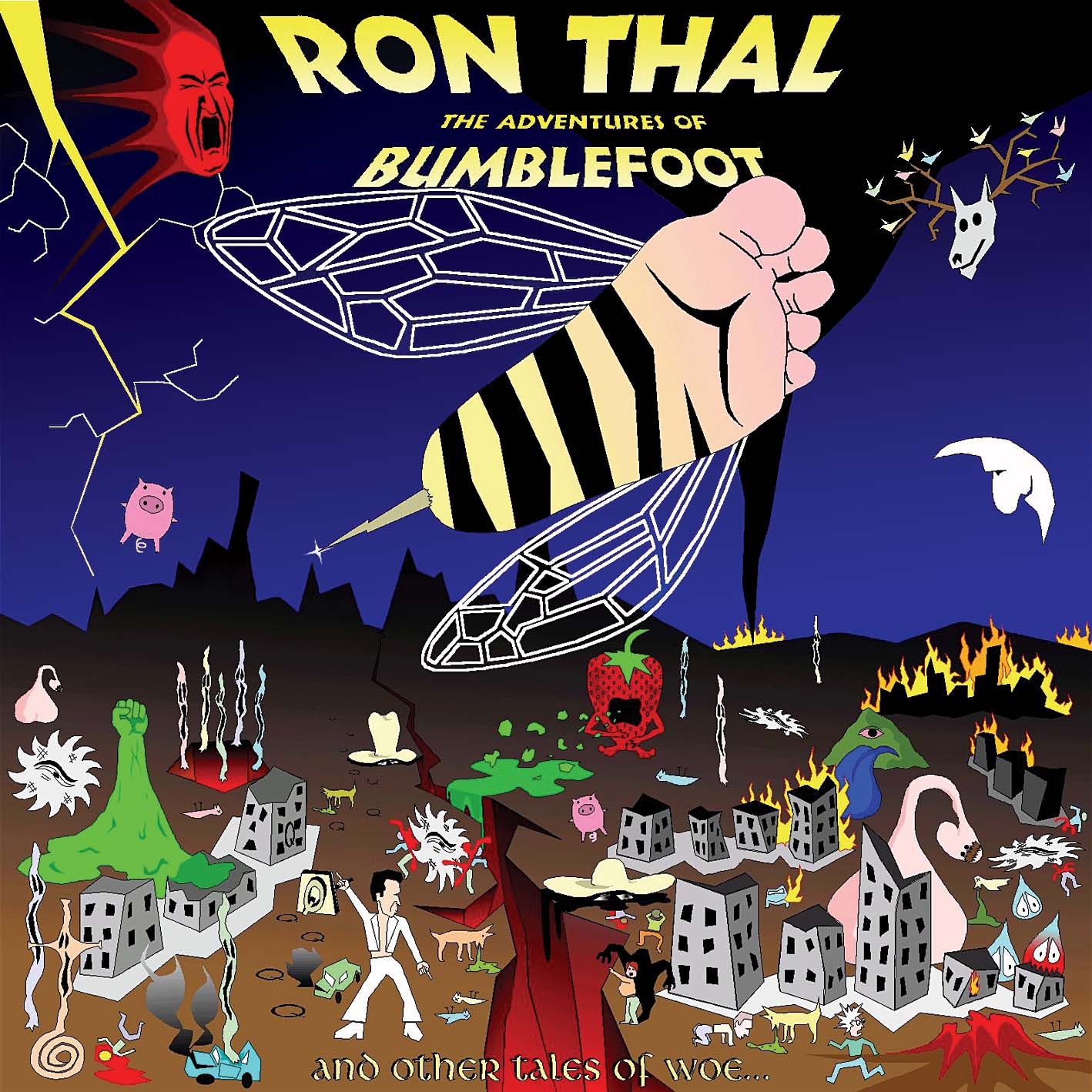
Rick: Do you have any plans for future projects that you haven’t started that you want to get to this year?
Ron: No. Every year for the last ten years I’ve been saying I wanted to do an instructional DVD, so I’m gonna say that again this year. It’s not gonna happen this year, but, I’m gonna say it again.
Rick: Keep it on the back burner, you know?
Ron: It’s something that I want to do, but never have the time. There’s always something that needs priority. And also I’m just so busy wearing all those other hats that I never get a chance to just collect my thoughts and get the momentum going.
Rick: And make sure you’re doing it right, getting the quality.
Ron: Yeah. The first thing I have to do is get a lavalier mic, which I decided I’ve definitely got to do this year. That will be the first step toward actually making it happen. Once that happens, that’s one step in the right direction.
Rick: I guess you’ve re-released The Adventures of Bumblefoot.
Ron: Oh, yeah.
Rick: What’s in the 200 pages? Is it like a comic book plus transcription?
Ron: That is the absolute complete transcription of every single thing done on that album, so it’s bass, every guitar track. Also it’s the notation, the fingerings, the picking, the tab, any helpful hints, little things like ‘Hand touches this string while…’, all that kind of stuff.
Rick: How long did that take to pull together?
Ron: It was six months of transcribing and then after that another six months of putting it all to PDF and typesetting and getting it to book form.
Rick: How did you quality check it as far as going back and proofing it to make sure that you got it right?
Ron: In the first six months?
Rick: For the final piece. You’ve got to go back and make sure that you didn’t write something and mean something else.
Ron: Originally when I did it, I put the album out and then I took every track and just put it on a cassette just by itself and listened back and also remembered what I played, would just sit there with a guitar in my hand, play the parts and tab out what I was playing. I just knew if it was right or not.
Rick: Sort of a first shot, you got it down the first time.
Ron: Yeah. That was so much tougher than actually making the album. The album was on Shrapnel Records, came out in ‘95 and it was out of print for years. Finally, they wanted to put it back out there, so we added a couple of songs off a video game soundtrack that I did, with the tab book and everything.
I’m taking the money from all the sales on my side of that stuff and donating to medical research. I use the stuff to give back and help out when I can.
